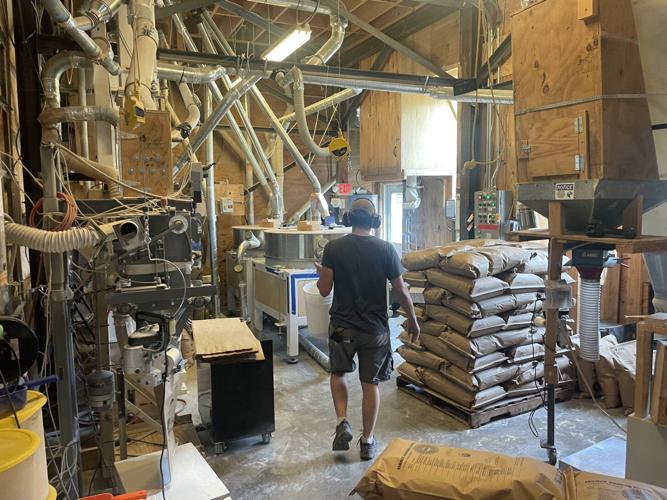TRUMANSBURG, N.Y. — It started with the 2007 purchase of a Meadows stone mill from North Carolina, initially stashed in Tompkins County organic grain farmer Thor Oechsner’s barn while a dream percolated.
“I was working for Thor, and he and another farmer had the idea to process the grains, and they had bought a little mill,” miller Greg Russo said of Farmer Ground Flour’s humble beginnings.
It got even more humble.
In 2009, Russo milled 50 tons of flour in the backyard of Regional Access, an Ithaca-based company dedicated to building a thriving local food economy.

A local organic grain farmer drops off his crop to Farmer Ground Flour.
According to Farmer Ground Flour’s website, Russo, who grew up in the Washington, D.C., suburbs, “spent that first year transporting grain in his undersized truck, carrying sacks of grain up ladders, filling hoppers by hand and sleeping on pallets.”
“It just kind of spiraled from there,” said Russo, initially a religion and philosophy major who spent a summer working on a storied vegetable farm in Virginia that catapulted him in a new direction.
After working on a handful of organic vegetable and grain farms throughout the Northeast, he finished his degree in agricultural economics at Cornell. And he continued to farm.

Farmer Ground Flour miller/partner Greg Russo has gone from milling wheat in a backyard to overseeing a facility that serves artisan bakeries throughout the Northeast.
“I thought I wanted to be a farmer,” Russo said from the mill floor surrounded by sacks of flour. “It just kind of morphed into this.”
Farmer Ground Flour developed gradually, he said. It didn’t even have grain bins at first.
“We had it set up in the back of the barn, tried it out, had some success, rented a little space, had some success, built this place, and then added onto it three different times,” Russo said.
Farmer Ground Flour buys wheat from local organic farmers, including Oechsner. Its largest customer base is artisan bakeries that buy 25- and 50-pound sacks of flour.
“We ship direct to them,” said Oechsner, whose main role is to provide much of the raw materials.
Farmer Ground Flour can also be found in 2-pound bags at the GreenStar Food Co-op in Ithaca, at Wegmans and at Whole Foods in Boston and New York City.
“Our biggest seller is high-extraction bread flour,” Oechsner said. “But we also do spelt flour and einkorn, and we do buckwheat and we do rye, and we do all different kinds of corn products. Polenta is a really big seller for us.”
The mill uses a variety of spring wheat called Glenn.
“It threshes really hard, so people hate it,” Oechsner said.
But it does well in organic systems and makes great bread, he said.
“We’ve trialed Glenn against all of the new varieties and none of them do as good against weeds, and none of them bake as well as Glenn, in our opinion,” Oechsner said.

Farmer Ground Flour products in 2-pound bags grace the shelves of GreenStar Food Co-op in Ithaca, N.Y.
He should know. He also owns a bakery, with locations in Trumansburg, and, more recently, nearby Ithaca.
“Wide Awake Bakery, yes, so we’ve got a little bit of a vertically integrated thing where the farm owns a piece of the mill and a piece of the bakery,” Oechsner said. “So we own a little piece of the after-production thing all the way through to the end product, which is fun, because then your product actually turns into something delicious.”
Speaking of which, the bread mix is a blend of Glenn wheat and Warthog hard red winter wheat.
“I cannot grow enough wheat,” said Oechsner, who has about 1,000 acres under cultivation. “I grow all the rye, all the corn, all the buckwheat, but the wheat, we have about 10 farms that grow for the mill, which is great, because then we spread the production out.”

Wide Awake Bakery, part of a vertically integrated business that included Farmer Ground Flour, recently opened a location in Ithaca.
Farmer Ground pays a premium for the certified organic wheat — Wegmans and Whole Foods are now asking that the farmers become certified regenerative — because supporting local farmers is part of its mission.
“The reason I started the mill was so that farmers could get more money for their grain, and my partners at the mill believe in that too,” Oechsner said. “We actually pay way above market price.”








